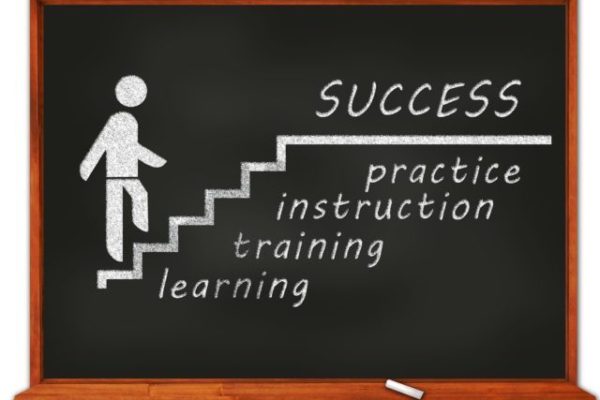As you well know by now if you’ve read many of my posts, one of the main goals of my website is to help you develop your study skills so you can become more successful with your studies. I have mentioned that becoming more successful does not mean getting all “A”s, but I have not gone into much detail about what it does mean, except to say that making improvements to your study skills is the best way to increase your chances for success. In other words, I have not actually defined success, and I have no intention of doing so. Instead, I will offer advice and suggestions meant to help you develop your own definition, as well as how to adjust it as you need to, so that you will be able to be successful on your own terms. An important part of being successful is learning to measure success by your own standards, instead of always trying to measure yourself against siblings or peers who may seem to be more successful. It is also important to define success for yourself instead of relying on parents and teachers to define it for you. In order to be successful, you need to feel successful, and the more you are able to feel successful, the more successful you will be.
It can be a very tempting thing to compare yourself to siblings or peers, to constantly see them as more successful than you are, if they get higher grades, seem more organized, or do not need to work as hard or as long as you do to get good results. As hard as it may be to do, the first step toward feeling better about your own success is to stop comparing yourself to others. Maybe you have a sibling or friend who gets straight “A”s. Maybe you see your sibling have more time for fun after school than you do. Maybe when you receive grades for tests, you have friends who always want to know how you did, so they can make sure you know that they did better. Many teachers realize how deflating this can be to students who don’t do as well, and try to discourage or outright ban the sharing of grades, and yet, you may still have classmates who just can’t help but be determined to find a way to share their grades anyway. In order to resist the temptation to let any of these things get you down, keep your focus on your own grades, and measure success in different ways. If you get a higher grade on a test in a challenging subject than you did on the last one you took, if you did well on an assignment because you put effort into it and applied your developing study skills to it, or your writing grade improved because you did a better job taking teachers or peers’ editing notes than you did before, these are all successes you can both take pride in and plan to build on, and they are all examples of how seeing and measuring the improvements you make matters more than the number or letter written at the top of your paper or recorded in a grading portal.
Another thing that can be very tempting is allowing your parents and teachers to define success for you, instead of learning to define it for yourself. Obviously, as a younger student, you needed to be taught the basics of what teachers and parents expect of you, but back then, most of your assignments and tests were presented in ways that not only involved simpler content presented in smaller pieces, but also had a significant expectation of parent and/or teacher involvement in your work, and by extension, your success. As you moved through the elementary grades, parent and/or teacher involvement in your work should have gradually decreased, while their expectation that you work more independently should have gradually increased, so that by middle school, both teachers and parents could reasonably expect that you would not only meet their expectation that you complete ever more challenging work as independently as possible, but that you would in so doing learn to make their expectations for your success your own. Though there are certainly students who are able to do this, students whose love of learning, natural intelligence, and/or intuitive understanding of study skills and how best to apply them to increase their success allow them to avoid the pitfalls on the road to success that students with various learning challenges may face, many more students struggle to adjust to increased expectations, as well as to the idea that they should strive to make their success their own. Most middle school teachers expect their students to need time to adjust to becoming more independently successful learners, and many schools have implemented study skills lessons for everyone to help all their students adjust. However, teachers often expect that all their students will adjust on the timetable they set, and that no matter any individual students’ lingering challenges, they will all be able to figure out how to define success on their own terms and no longer need direct study skills support to be able to do it. Teachers are not completely wrong in this assessment – as I’ve stated before, teachers have had expectations placed on them in recent years to cover more and more difficult content in less and less time, and parents not only may not have learned all of this content, they also have a lot more on their plates than helping you with your studies – but that does not mean you should assume that if your teachers and parents are no longer able to provide the level of direct support you feel you still need, it is up to them to figure out how to fix it. They want you to do the best you can do, and for all but the strictest among them, they do not expect that to mean straight “A”s. What they expect instead is that you will make the best possible use of whatever help you are given and whatever skills you’ve been taught to find success that both you and they can believe is well-earned by you, and not simply handed to you. Knowing you did the best you could to earn your grades, whatever they turn out to be, and remembering that you can always make adjustments to your study skills, as well as to how you handle any other support you receive, if you are not satisfied with your grades and desire to do better, is the best way to make your success your own and continually strive to define success on your own terms.
As important as it is to define success on your own terms instead of comparing yourself to siblings and peers or expecting parents and teachers to define success for you, perhaps the most important thing to remember about defining success for yourself is that in order to be successful, you must feel successful. It is easy to look at grades and tests and report cards and think that success is purely objective, and that if you don’t achieve success at a predetermined, fact-based level, you are not only not successful – you are actually a failure. Just as I always say you should never give up, no matter your challenges, so too I say that the only unacceptable way to define your own success is to automatically assume that not reaching whatever numerical or letter-grade bar you set for yourself makes you a failure. Just as I say that improving your study skills is a journey, so too is finding your own definition of success. Along the way, you may feel more successful sometimes and less successful other times, but if you focus on defining success by building on positive steps you’ve taken on your study skills journey instead of letting grades you wish were better get you down, over time, you will find that you are more and more able to define success, because you will know what it takes for you for reach it.
The definition of success is very broad, very subjective, and, most importantly, unique to each and every one of you. Moving beyond comparing yourself to siblings and peers or letting parents and teachers continue to define success for you is not easy, and it will not happen overnight. Learning to define success on your own terms means developing your definition of success right along with your study skills. It means accepting that your best is your best, as well as that needing to do better next time does not, and never will, make you a failure. Most of all, it means that in order to be successful, you need to feel successful. Whenever you feel successful, you should remember what you did to feel that way, so you will continue to do what it takes to be successful, build success upon success, and make your success your own.

